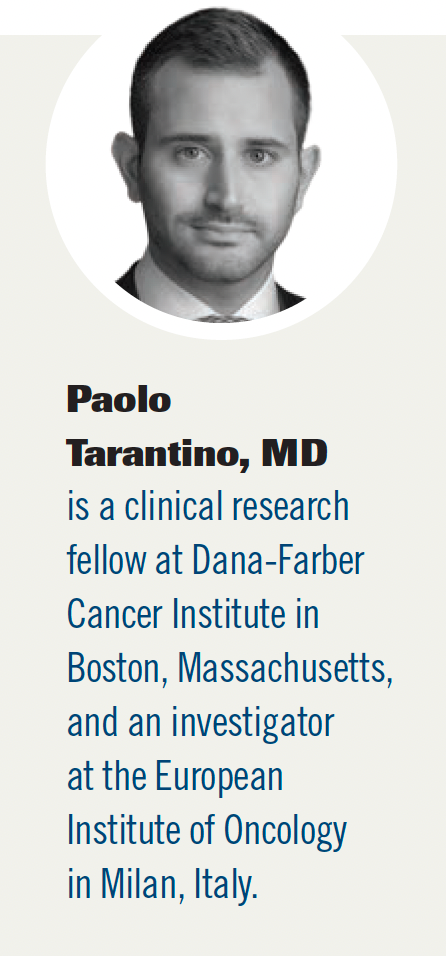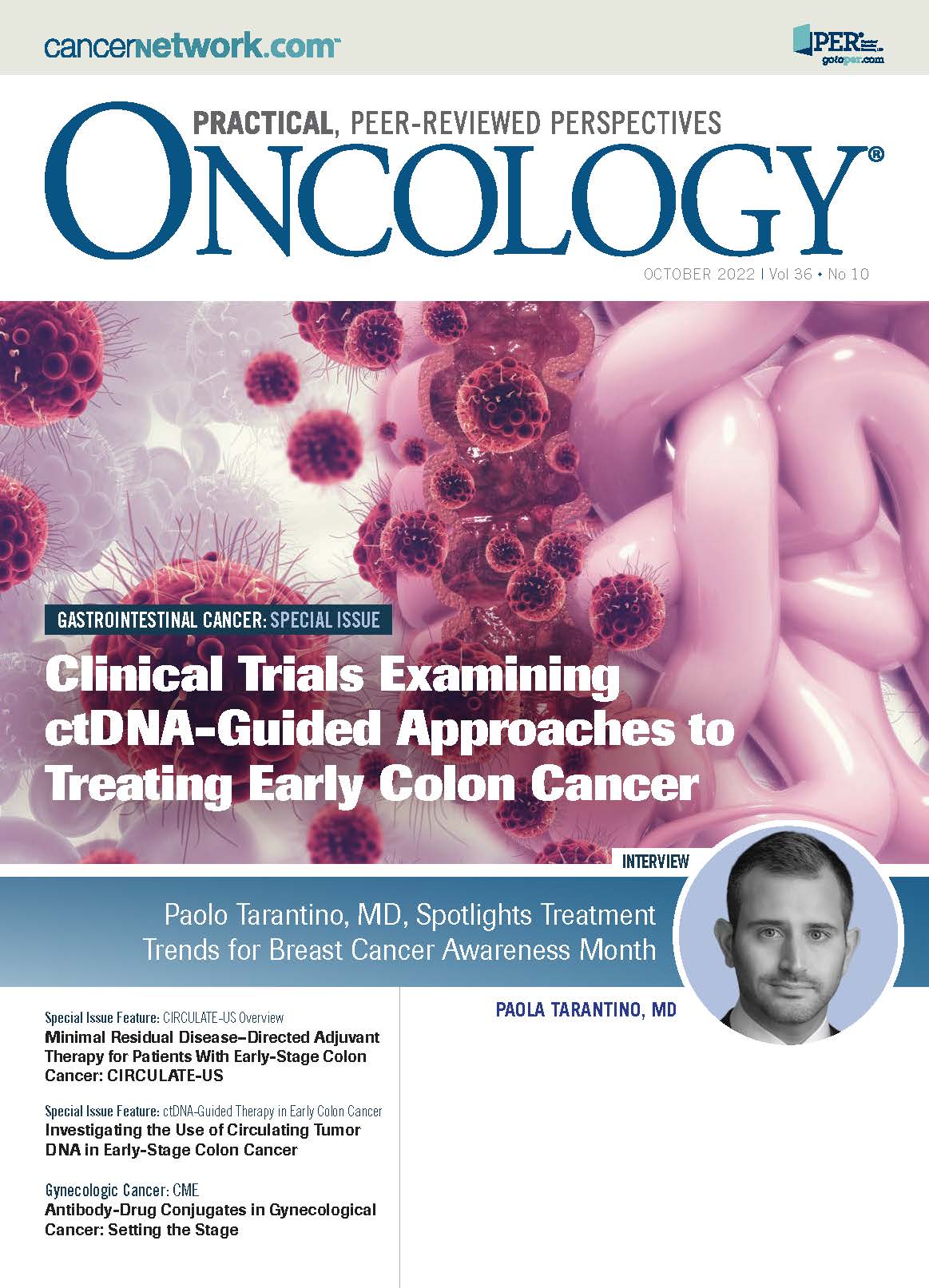Paolo Tarantino, MD, Spotlights Treatment Trends for Breast Cancer Awareness Month
In an interview for Breast Cancer Awareness Month, Paolo Tarantino, MD, discusses the importance of multidisciplinary care for patients with breast cancer, the most exciting data presented this year, and prospects for future research.

Antibody-drug conjugates (ADCs) have been at the forefront of care for patients with breast cancer in recent years. Recently, the ADC fam-trastuzumab deruxtecan-nxki (T-DXd; Enhertu) was approved for patients with HER2-positive breast cancer and patients with HER2-low breast cancer.1,2
In an interview with ONCOLOGY® ahead of Breast Cancer Awareness Month, Paolo Tarantino, MD, talked about the importance of multidisciplinary care for patients with breast cancer, the most exciting data presented this year in the HER2-positive and HER2-low space, where future research should be focused to improve treatment and patient care, and the possibility of using T-DXd in the HER-negative setting.
Q: What is your role as part of a multidisciplinary care team?
Tarantino: Oncology has evolved over time and has become more of a multidisciplinary practice, especially in breast cancer. It’s impossible to treat a patient with either early-stage or advanced-stage breast cancer without the involvement of a large multidisciplinary team, which in most cases includes medical oncologists, surgeons, radiation oncologists, geneticists, pulmonologists, and cardiologists among many others. The care of patients with breast cancer and most other cancers is like an orchestra. Each physician is part of an orchestra and is needed for the final symphony, the final treatment, the appropriate treatment for each tumor.
Q: What has been the biggest breakthrough in the management of breast cancer within the past year?
Tarantino: At the [2022 American Society of Clinical Oncology Annual Meeting] during the plenary presentation of the DESTINY-Breast04 trial [NCT03734029],3 there was this impressive standing ovation. It was an emotional moment. This was related to the fact that something unprecedented [was shared] during that presentation. [We told the audience that we had] observed the benefit of anti-HER2 drugs for the first time expanding from HER2-positive breast cancer, which accounts for [approximately] 20% of all patients with breast cancer, toward what we now call HER2-low breast cancer, which is an additional 50% or 60% of all patients with breast cancer.
This ADC, T-DXd, which delivers a highly potent chemotherapy payload in a targeted way, has shown to be much more effective than standard traditional chemotherapy for patients with metastatic breast cancer and low HER2 expression. This was unprecedented because it not only showed a benefit to progression-free but also overall survival, which is something we don’t see every day in metastatic breast cancer. That standing ovation was the highlight of this year. At the same time, ADCs are reshaping the way we [manage] breast cancer because they’re bringing chemotherapy, which we’ve developed in the past 50 to 60 years, to a new age. [This is] a targeted delivery of chemotherapy that is more effective and can avoid some [adverse] effects. In general, ADCs are the drug of the year and DESTINY-Breast04 is the highlight of 2022.
Q: What are some barriers to optimal care in patients with breast cancer that need to be overcome in the near future?
Tarantino: As an Italian physician who has moved to the United States, I’ve experienced the striking disparity in access to drugs among countries. In the US, it is easier to get access to some new drugs as compared with Europe, and particularly Italy where I was practicing before. Nonetheless, there is a wide disparity in the access to many drugs. This is an important barrier to optimal care because sometimes there is a highly effective treatment but you cannot always use it the way you would want. This is where we need to work hard to ensure access to highly effective drugs for all the patients who might benefit.
A second important aspect is that we still are working on the right sizing of treatments. This is true in the metastatic setting, but even more for the [management] of early breast cancer. I’m lucky to work at Dana-Farber Cancer Institute]with Sara M. Tolaney, MD, MPH, who has worked a lot in this field and has developed de-escalated regimens that allow us to treat patients with fewer toxicities, but with the same efficacy of treatments. We still need to work hard on this because still many patients are overtreated. We are developing promising tools that may allow us to achieve right-sized treatments, including circulating tumor DNA, gene signatures, and other biomarkers that can help us understand which patients need more and which patients need less. In the end, the aim is treating and curing patients with cancer with the least possible amount of adverse effects. This is one important barrier right now because we don’t have the tools or the biomarkers readily available. We are still developing them, but I think we are getting there.
Q: Which ongoing clinical trials are you most excited to see the results of?
Tarantino: Usually we start developing drugs in the pretreated metastatic setting, then we slowly bring them into the earlier-line settings, and finally into the curable setting. This is what is happening now and we are [seeing] the benefit of ADCs in early-line settings. We have seen it already with T-DM1 [ado-trastuzumab emtansine; Kadcyla], which is the first ADC to be approved for breast cancer. When it was brought in the early setting, it is shown to be able to improve cure rates in the KATHERINE trial [NCT01772472].4
Now there are some trials that are doing the same with novel ADCs. For T-DXd, there is the DESTINY-Breast05 trial [NCT04622319] that is comparing T-DXd with T-DM1 in the adjuvant setting to see if we can further improve cure rates for the HER2-positive disease. Sacituzumab govitecan [Trodelvy] is an anti-TROP2 ADC that is being tested in the SASCIA trial [NCT04595565] in the same setting to try to improve cure rates. In the neoadjuvant setting, there is the NeoSTAR trial [NCT04230109]. In general, there are several trials in the neoadjuvant or adjuvant setting that aim to expand the benefits of ADCs to the early setting. Some of these trials could bring important benefits, but for these we will need to wait a few more years.
A trial we might hear about sooner is the DESTINY-Breast06 trial [NCT04494425], which is testing T-DXd both in patients with HER2-low as well as HER2 0 [immunohistochemistry 0] breast cancer. It’s a provocative idea; notably this drug has already shown some early activity in patients with HER2 0 disease, thus T-DXd might work in this category and expand its benefit to a much larger population of patients. This is one of those trials that could further change the way we categorize breast cancer beyond the recent evolutions.
Q: What do we have to look forward to in the breast cancer space?
Tarantino: Drug development is going fast, and it’s going well; we’re developing highly efficacious drugs. Now we are understanding how to master their use. In general, there’s a lot of optimism regarding several new drugs, some of which have been recently approved and some of which may be approved in the coming months and years. The second point is [regarding] biomarkers. We cannot use the same drugs for all patients, we need to tailor our treatments. We need to dedicate extensive efforts not only to drug development but also to identifying biomarkers that tell us up front which patients require an intensified treatment and who might instead be treated with less. [We also need to know] which patients might derive benefit from a specific drugs. For instance, we use a TROP-2 ADC but we don’t assess for TROP-2 expression, although we have some data suggesting there might be increasing benefit [to this therapy] with increased target expression. We need to work on developing biomarkers to tailor treatments in clinical practice. We can be optimistic because we have been developing highly efficacious drugs. In the coming years, we’ll better manage breast cancer with increased precision.
References
- FDA grants regular approval to fam-trastuzumab deruxtecan-nxki for breast cancer. News release. FDA. May 4, 2022. Accessed September 20, 2022. https://bit.ly/3S0BWM6
- FDA approves fam-trastuzumab deruxtecan-nxki for HER2-low breast cancer. News release. FDA. August 5, 2022. Accessed September 20, 2022. https://bit.ly/3f7be5V
- Modi S, Jacot W, Yamashita T, et al. Trastuzumab deruxtecan in previously treated HER2-low advanced breast cancer. N Engl J Med. 2022;387(1):9-20. doi:10.1056/NEJMoa2203690
- von Minckwitz G, Huang CS, Mano MS, et al. Trastuzumab emtansine for residual invasive HER2-positive breast cancer. N Engl J Med. 2019;380(7):617-628. doi:10.1056/NEJMoa1814017
